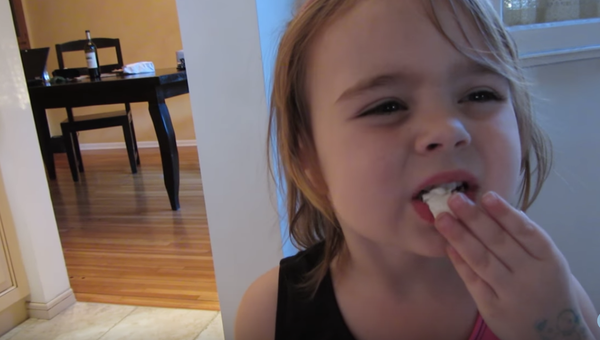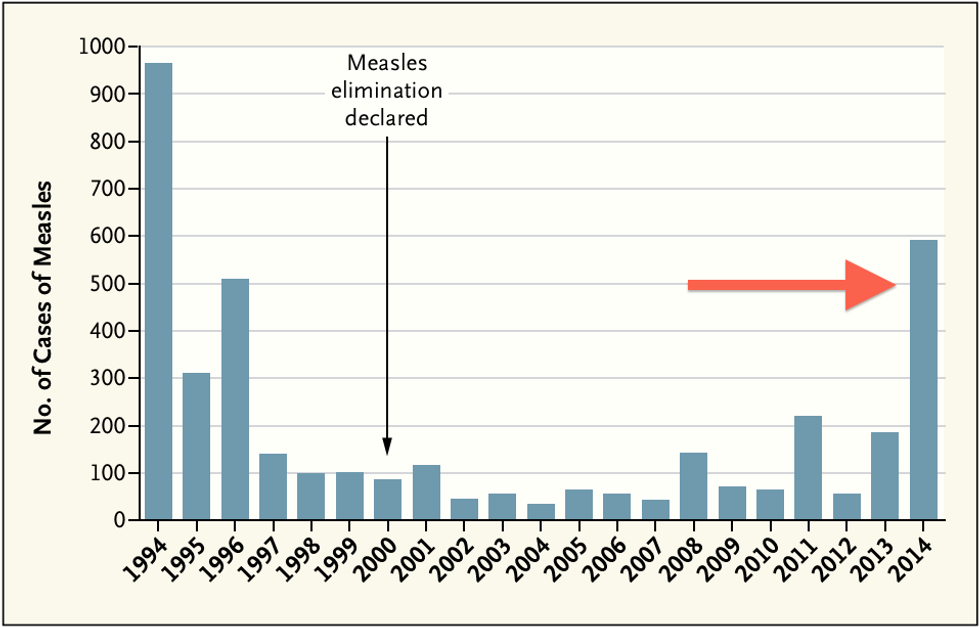I have compiled a full list of every legitimate reason you shouldn't get your children vaccinated. You will now be ready to go with a full arsenal of comebacks for when your son's principal calls to ask why he hasn't had his vaccinations. Ready? Here it goes:
1. None.
Would you like me to repeat myself for the people in the back? There is no good reason to not vaccinate your children. But just in case that doesn't convince you, I'll break it down for you. The anti-vaccination campaign is absolutely ridiculous, not to mention dangerous. The extent of the scientific backing for the anti-vaccination movement is summed up in Donald Trump claiming, "We had so many instances [in which] a child had a vaccine, and came back and a week back had a tremendous fever, got very very sick, and now is autistic."
Trump claims that autism is becoming an "epidemic." I'm not denying that autism is indeed on the rise, but to put it into perspective for you, here's a list of other things that are also on the rise: per capita cheese consumption, civil engineering doctorates awarded, sale of organic foods, deaths by being tangled in bed sheets and cost of potato chips. Does this mean potato chip cost or engineering doctorates cause autism? Probably not. It's a fundamental scientific principle: correlation does not equal causation.
One thing that hasn't been on the rise in recent years, however, is vaccines. In fact, using this method, cheese consumption is more closely related to autism than vaccines are. If vaccines are really causing autism, there should be a decline in autism rates correlating with the decline in vaccination rates.
So what triggered this leap to suggest vaccines are to blame for autism? Well, it is largely credited to a 1998 study conducted by Andrew Wakefield. The study suggested a link between Autism Spectrum Disorder (ASD) and the vaccine that prevents measles, mumps and rubella (MMR). Later, however, the British Medical Journal (BMJ) exposed that Wakefield had altered or misrepresented the medical histories of 12 of his subjects to support his idea. BMJ called the experiment an "elaborate fraud." Why would Wakefield do this, you ask? It turns out, he was paid by a law firm that intended to sue vaccination companies. Wakefield's medical license has since been revoked, but the effects of his faulty experiment still linger today.
Another reason people often link these two things is because of the age in which they occur. According to the CDC, Autism Spectrum diagnoses appear at about 3 years, 10 months of age for autistic disorder, 4 years, 1 month for Pervasive Developmental Disorder - not otherwise specified (PDD - NOS), and 6 years, 2 months for Asperger disorder. The majority of vaccinations in early childhood occur during this same time frame. Nearly all vaccinations are completed by roughly age 6 years old.
For a concerned parent, it could be easy to make the leap that these vaccinations are what caused their child's autism as this is the easiest source of blame. Vaccines are likely one of the closest life events to the autism onset, but they are none other than a coincidence. It is important to note that the millions of people every year who are vaccinated but do not go on to develop autism greatly outweigh the people who do develop autism.
While autism is on the rise, vaccinations are on the decline, causing even more dangerous illnesses to jump back up into society. Illnesses that were once thought to be eradicated. Measles has had various outbreaks in recent years; roughly 15 years after it had been declared "eliminated. "According to the CDC, in 2014, 23 separate outbreaks were recorded, totaling 667 cases in the United States alone. This is the highest number of yearly cases recorded since it was determined "eliminated" in 2000.
The majority of people who were infected were unvaccinated. Vaccines, however, are not perfect. Ideally, 100% of people who are vaccinated should not contract an illness, but that isn't always the case. Vaccines are more effective when everyone around a person is also vaccinated. Although unlikely, it is still possible to contract an illness when vaccinated. It's a concept called herd immunity, meaning that when the majority of the population is vaccinated, the likelihood of an outbreak significantly drops.
I do hear your concern. It seems, as a parent, you should be able to do what is "best" for you and your child and maybe it seems a little far-reaching for the government to mandate vaccinations in order to tell you what is best for your child.
But here's the reality: the government shouldn't even have to tell you that vaccinating your kids is the right choice. You should know what the scientific backing vaccinations have and want to vaccinate your kids. By not vaccinating your children, not only are you putting them at risk for contracting a painful and life-threatening illness, but you are also putting the health of everyone around them at risk -- their family, classmates, teachers, friends and daycare providers. This is why vaccines are mandatory at most schools. Certainly, the government does not wish your child alone any harm, but schools are filled with a high concentration of people. If one person contracts an illness, an outbreak is just waiting to occur.
You likely don't know anyone who died from smallpox or even had a case of the measles. You probably didn't grow up with an outbreak of diphtheria devastating your town. That's exactly the point. There is a reason time and money and effort were put into the creation of these vaccinations. These illnesses are dangerous and can even be deadly. Not knowing anyone affected by these illnesses is a blessing, but it can also be dangerous. To most of us, these illnesses are extinct. Even without a vaccine, we think the likelihood of contracting such an illness is non-existent. Unfortunately, that's not the case. With more and more people refusing vaccinations, the likelihood of an outbreak is rapidly increasing.
We are already seeing the impact in measles, mumps and whooping cough, but even more fatal diseases could make a return as well. I'll spare you the gruesome details, but if you are unaware of what these diseases look like, simply Google image search smallpox, measles, mumps, or diphtheria. I can just about guarantee you wouldn't wish it on your worst enemy, let alone your own children.
This is, however, what you're risking by not vaccinating your children. So, before you hop on the anti-vaxx bandwagon, consider whether it's worth the risk.






















